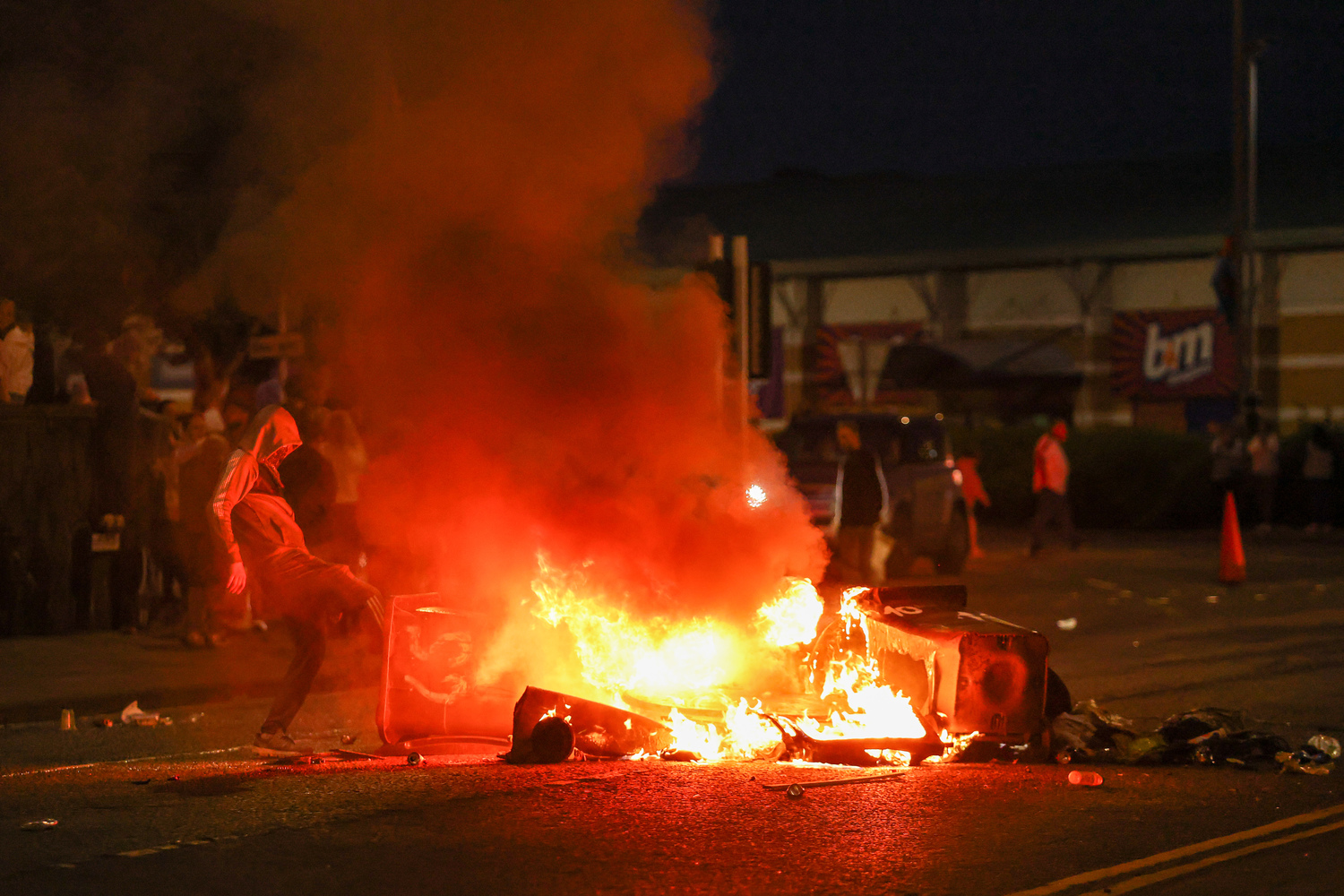More than a third of those arrested during the violent disorder in Ballymena and surrounding towns had previously been reported to the PSNI for domestic abuse.
The figures were released to The Detail following a freedom of information request.
There were 53 people arrested in relation to the disorder, of which 19 - or 36% - had been previously reported for domestic abuse.
The rioting in Ballymena began after a protest over an alleged sexual assault of a teenage girl.
Two 14-year-old boys, who spoke in court through a Romanian interpreter, deny charges of attempted rape.
In the ensuing days of violent disorder, described by police as "racist thuggery", families were burned out of their homes and more than 100 police officers were injured.
Around a quarter of those arrested (14) were aged under 18.
According to police data, minors are statistically rare perpetrators of domestic abuse, accounting for less than 4% of cases each year.
Last month, The Detail reported that almost half of those arrested for the August 2024 race riots in Belfast had previously been reported for domestic abuse. Nine of the 48 people arrested were minors.
‘Naked scapegoating’
Her Loyal Voice, a loyalist feminist group, said the focus on violence against women and girls was lost and turned into “racist, anti-immigrant hate.”
Caroline, not her real name, asked not to be identified as her employer does not allow her to engage in activism.
“It's just naked scapegoating, which has been a tactic of our betters for generations, to find another vulnerable working-class group and say to us, ‘Look, that's where your problems are,’” she told The Detail.
“And we always have to push back against that, because it harms our community, it harms other working class communities.”
“Instead of tackling violence against women and girls, they're using a distraction technique: ‘It's not our men, it's not our community. We're not the problem. It's this group of people who are coming in, and they're the ones doing it.’”
Her Loyal Voice released a statement during the riots, condemning the violence as a “pogrom.”
The statement highlighted the “pandemic” of male violence against women and girls in Northern Ireland, stressed the need for comprehensive relationship and sex education in schools, and lamented “the crisis of leadership” within loyalism and unionism.
Members of the group used social media to put out an anti-racist message during the riots, she said.
This included commenting on high-profile English far-right accounts such as Katy Hopkins or Tommy Robinson, who were “stirring up outrage within the loyalist community for clicks, offering us no real solutions.”
Robinson’s 14 X posts about Ballymena in June reached an average of 1.3 million accounts each, according to a report by Sky News.
Caroline, who is from North Antrim, said there needs to be compulsory and comprehensive relationship and sexuality education (RSE), starting in primary schools.
“What we really need is to overhaul our education system, and to have a real cultural change in how men treat women,” she said.
“That's hard, that's going to take work, and that's going to erode a lot of the privilege that men in power currently enjoy.
“The politicians and the other people in positions of power, both seen and unseen, don't want to do the difficult work of tackling patriarchy.”
‘Smokescreen’
Elaine Crory, from the Women’s Resource and Development Agency, said the disorder in Ballymena was “entirely motivated by the race of the perpetrator.”
“They use the language of ‘violence against women and girls’ as a smokescreen to cover for the racism. It's an effort to turn all these conversations about violence into conversations about migration,” she said.
“It's very much punching down and using women and girls as the boxing gloves to do the punching. And we don't appreciate that in the slightest.
“What we see over and over again is that the violence that women are experiencing is from their partner, or their former partner, inside of their home. That's true everywhere in the world.”
Domestic abuse accounts for approximately 20% of all recorded crime in Northern Ireland.
Such offenders are most likely to be white (over 96%), according to police data. They are also most likely to be UK or Irish nationals (92%).
Ms Crory said that in these discussions about violence and safety, women “are being spoken about as if we cannot speak for ourselves.”
“Feminists have been saying from day dot that we can advocate for ourselves, and that the protection we really need is from abusers in our own homes,” she said.
“What we really need are safe ways to get out. What we really need is sufficient housing for us to leave if we have to. What we really need is financial independence and equality.
“All of those things we're asking for, that actually would help, are far too boring for somebody who just wants to tap into a narrative which is ‘get rid of these people’.”
 By
By
